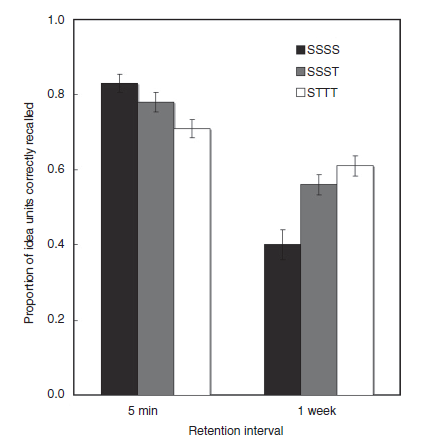For the uninitiated amongst us, retrieval practice is a learning strategy where the deliberate recall of information is used to improve long-term memory (Agarwal 2018).
The effect of retrieval practice, also called the testing effect, has been studied in an educational setting (Roediger 2006). Students used different combinations of study (reading a text for 7 minutes) or testing (writing down as much as they could remember from the text for 7 minutes). One group of students studied the test four times (SSSS), one group studied it three times and then tested themselves (SSST) and the final group only studied it once before testing themselves three times (STTT). Five minutes later the group that only studied the text performed best and the group who tested themselves performed worse. However, after a week, the opposite effect was observed, with the group that only studied the text performing significantly worse.

This effect has significant implications for our classrooms and how we prepare students for terminal exams. Many teachers before me have described their methods of incorporating retrieval practice into their classrooms, hence the quote at the top. One of the most commonly discussed methods is the retrieval roulette, created by Adam Boxer for his chemistry students but widely adapted for use in other subjects. The retrieval roulette is “A simple Excel program that uses a list of questions and answers to generate a random 10 question quiz” (Boxer 2017).
My retrieval roulette, designed for use with the OCR 21st Century course, can be found here: https://drive.google.com/file/d/1RoMtShlRHuVES6RZ6YCn3wiZ65qdH8Gj/view?usp=sharing
And Adam Boxer keeps an archive of examples from a variety of subjects on his blog here: https://achemicalorthodoxy.wordpress.com/2018/08/18/retrieval-roulettes/
This brings me to the other aspect of this blog, the thorny issues of homework. The EEF review of the evidence of homework for secondary aged pupils (EEF 2019) shows that homework has a positive effect, where students make, on average, an additional five months progress. However, we all know that when you set homework, you have to check it and you have to mark it. To avoid drowning in homework, I used to set it for KS4 students every two weeks. But I always felt bad about it, like I was short-changing the students. In retrieval practice I have found a solution to this problem.
Much like Adam Boxer describes in his blog (Boxer 2017), I give students a set of questions and answers for each topic that correspond to those on the retrieval roulette; at the moment these are just on an excel spreadsheet but I am working on putting them on Quizlet. Every second week I ask them to revise test themselves using the questions on a particular topic. Then, at the start of the next lesson we do a quick 5 question quiz, like the example given below. I print out the questions for students to answer, they write on the answers and stick them in their books. Retrieval practice is best if it is low-stakes (Agarwal 2018) so I don’t collect scores. However, I do ask students to correct their answers and reflect on whether there is a particular area they need to revisit. If I’m honest, I also look through their corrections when I mark their books and note down any common areas we need to revisit.

One other important benefit of this strategy is the link with prior learning. Willingham (2006) describes the importance of background knowledge in understanding new information. With that in mind I always ask students to revisit topics with a connection to the new material about to be covered. They can then use this relevant information to make sense of and improve understanding of the new content. My use of the retrieval roulette is therefore slightly less random than it is designed to be as I often prioritise questions that are relevant to upcoming material. However, I do like the random generator embedded in the Excel file because it does help me choose more quickly!
To summarise, my recommendations for retrieval practice in the classroom:
- Ask students to revise a particular topic for homework.
- This topic should be relevant to the material about to be studied.
- Administer a low-stakes quiz at the start of the next lesson.
References:
Agarwal PK, Roediger HL, McDaniel MA and McDermott KB (2018). How to use retrieval practice to improve learning. St Louis University, Washington. Available at: https://www.retrievalpractice.org/library
Boxer A (2017) https://achemicalorthodoxy.wordpress.com/2017/05/04/the-retrieval-roulette/ (accessed 230419)
Roediger III HL and Karpicke JD (2006) Test-enhanced learning: Taking memory tests improves long-term retention. Psychological science, 17(3):249-255. Available at: http://learninglab.psych.purdue.edu/downloads/2006_Roediger_Karpicke_PsychSci.pdf
EEF (2019) Homework (secondary). Available at: https://educationendowmentfoundation.org.uk/evidence-summaries/teaching-learning-toolkit/homework-secondary/#closeSignup (accessed 210419)
Willingham DT (2006) Why Knowledge Helps. American Educator. Spring 2006. Available at: https://www.aft.org/periodical/american-educator/spring-2006/how-knowledge-helps
3 thoughts on “Retrieval practice and the burden of homework”